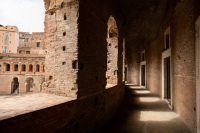News and Events
News
The Department of Classics and Ancient Mediterranean Studies announces three prizes for the best undergraduate student essays of the 2025/26 academic year. If you’ve written a strong paper recently, we want to read it!
David Gross, a fourth-year student double-majoring in classics and ancient Mediterranean studies and economics was named Liberal Arts college marshal for the fall 2025 commencement ceremony.
October 2, 2025
– October 2, 2025
5:30 pm
Foster Auditorium, 102 Paterno Library
On Thursday, Oct 2, Penn State is delighted to be hosting Prof. Rocco Palermo (Bryn Mawr), who will deliver the Kershaw Lecture on Near Eastern Archaeology for the Archaeological Institute of America.
The Department of Classics and Ancient Mediterranean Studies is excited to be welcoming Profs. Joshua Roberson and Katherine Krauss to the faculty in 2025/26.
The master of arts program in Ancient Mediterranean Studies is a broad, interdisciplinary program focused on the cultures, literatures, and histories of the ancient Mediterranean world. Students combine course work on research methodologies with seminars in their own areas of interest. Possible areas of interest could include—but are not limited to—the Ancient Near East, Egypt, the Levant, the Hebrew Bible, early Judaism, Greece, Rome, Early Christianity, and the modern reception of the ancient Mediterranean world. The ultimate aim of the M.A. is to prepare students for a variety of professions, such as further graduate work, museum work, library science, or secondary teaching.
The Department of Classics and Ancient Mediterranean Studies announces three prizes for the best undergraduate student essays of the 2024/25 academic year. If you’ve written a strong paper recently, we want to read it! Click on this post for more details.
Events
No Events found





